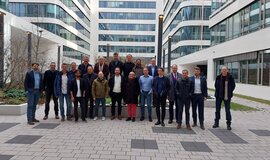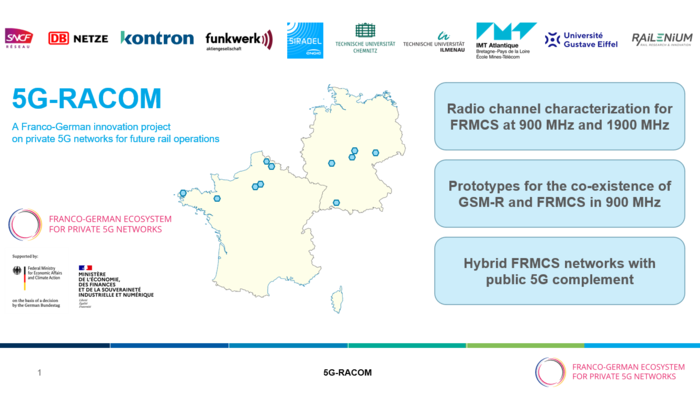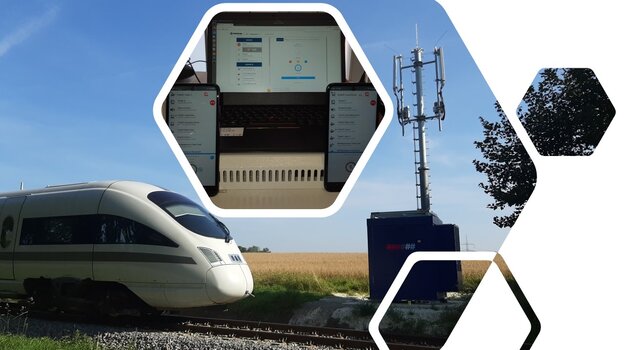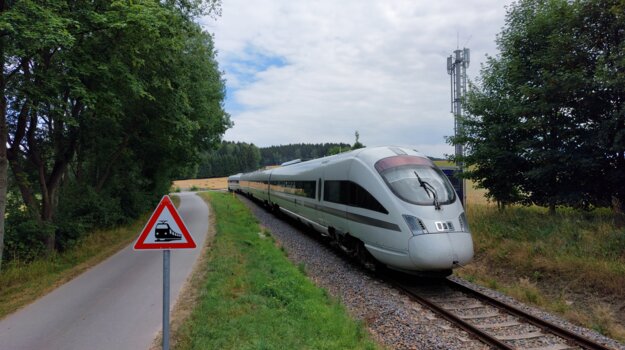
5G-RACOM – A Franco-German innovation project on private 5G networks for future rail operations
The 10 partners of the innovation project “5G for Resilient and Green Rail Communications (5G-RACOM)” have met in Frankfurt, Germany, to pave the way for a successful Franco-German cooperation which studies the efficient spectrum usage and robust 5G solutions for the Future Railway Mobile Communication System (FRMCS) – the successor of today’s GSM-R system.
The introduction of digital technologies enables more data transfer in the railway system. Sensors and cameras in trains, in stations and on tracks e. g. collect information that has to be transmitted, processed and analysed in real-time. To deal with these challenges the railway sector needs a leap in communications technology towards a high-performance mobile radio network.
The Future Railway Mobile Communication System (FRMCS) is the answer to this Challenge. Based on 5G technologies, FRMCS will be the successor of today’s GSM-R system. It will enhance the wireless communication between trains and infrastructure and is an important platform for railway digitalization. It enables the integration of new technologies of Digitale Schiene Deutschland and is therefore a prerequisite for increasing rail transport capacity and strengthening the railway system as the most important player towards a climate-friendly transport. Currently, the first version of the FRMCS specifications is being finalized and will be published as a standard with the upcoming TSI. Alongside this process, the FRMCS features to serve mission-critical applications are validated and further improved through early proof-of-concept (PoC) tests.

The Franco-German innovation project “5G for Resilient and Green Rail Communications (5G-RACOM)” will be significantly contributing to the FRMCS standard and provide prototypes for the FRMCS ecosystem. 5G-RACOM studies spectrum-efficient and robust 5G solutions for FRMCS. The 10 cooperation partners of the project pursue three targets on the road towards a resilient and robust FRMCS system and network design:
- a deep analysis of the radio propagation conditions at 900 MHz and 1900 MHz in order to improve radio planning for FRMCS and optimize infrastructure deployment with highly efficient utilization of both spectrum bands
- a study for parallel operation of GSM-R and FRMCS in 900 MHz and the creation of prototypes for the technology co-existence in this frequency band as well as a fast technology migration
- a study of realization options for hybrid FRMCS networks which combine private 5G connectivity of the railways with mobile connectivity from public operators, e. g. as a fallback case or as a capacity complement. It is crucial to select appropriate multi-path protocols, which are supposed to select best traffic paths in railway and public mobile networks, that allow seamless operation and guarantee the high Quality-of-Service of the mission-critical applications – therefore making FRMCS more robust
The 5G-RACOM project runs over 3 years until November 2025. It is jointly coordinated by DB Netz AG within the sector initiative Digitale Schiene Deutschland and SNCF Réseau and brings together leading companies and academia of the railway communication sector, being Kontron Transportation, Funkwerk, IMT Alantique, Siradel, Railenium, Université Gustave Eiffel, TU Chemnitz and TU Ilmenau.
The project test activities will be realized in French and German railway testbeds. For validation of 5G multi-path solutions, DB’s Digital Rail Testbed in Erzgebirge will be used. Here, a (pre-standard) FRMCS environment has already been established for different tests and projects – amongst them, next to 5G-RACOM, the EU Horizon 2020 project 5GRail which aims to validate a subset of the first version of the FRMCS standard features on European level.
With the 5G-RACOM project, DB Netz AG and SNCF Réseau together with the project partners continue their commitment to drive FRMCS not only in design and architecture but also in live prototyping and demonstration.
The project is funded by the German Federal Ministry for Economic Affairs and Climate Action (BMWK) and French Ministry of Economics, Finance and Industrial and Digital Sovereignty.

